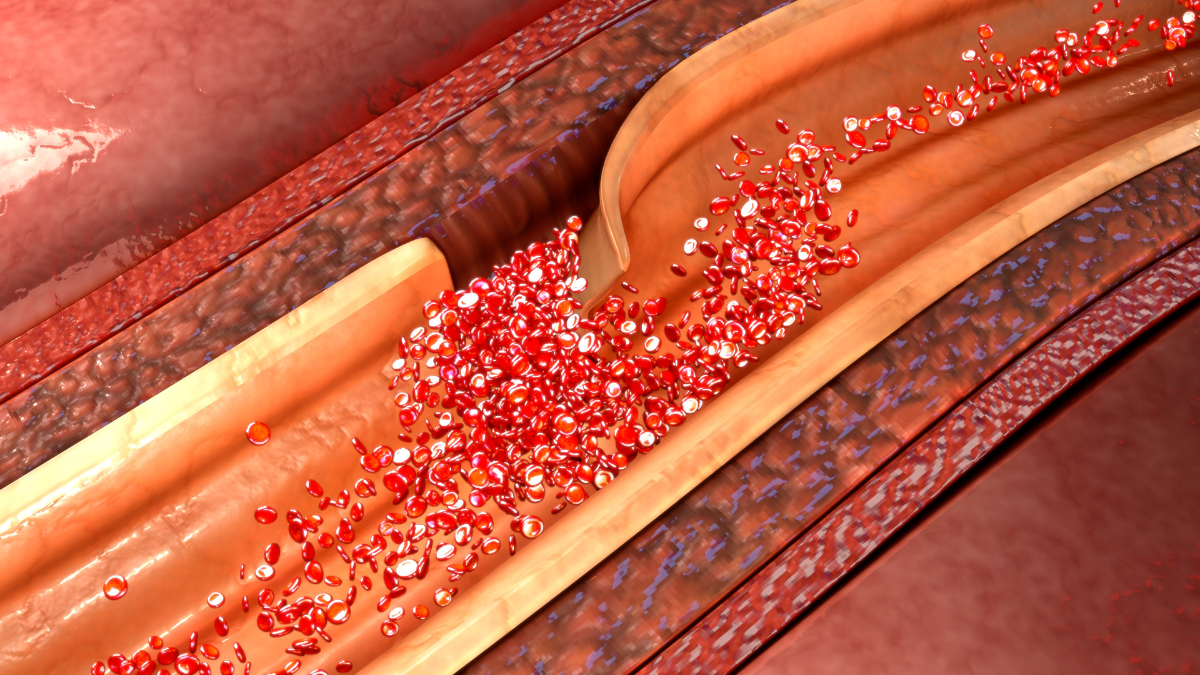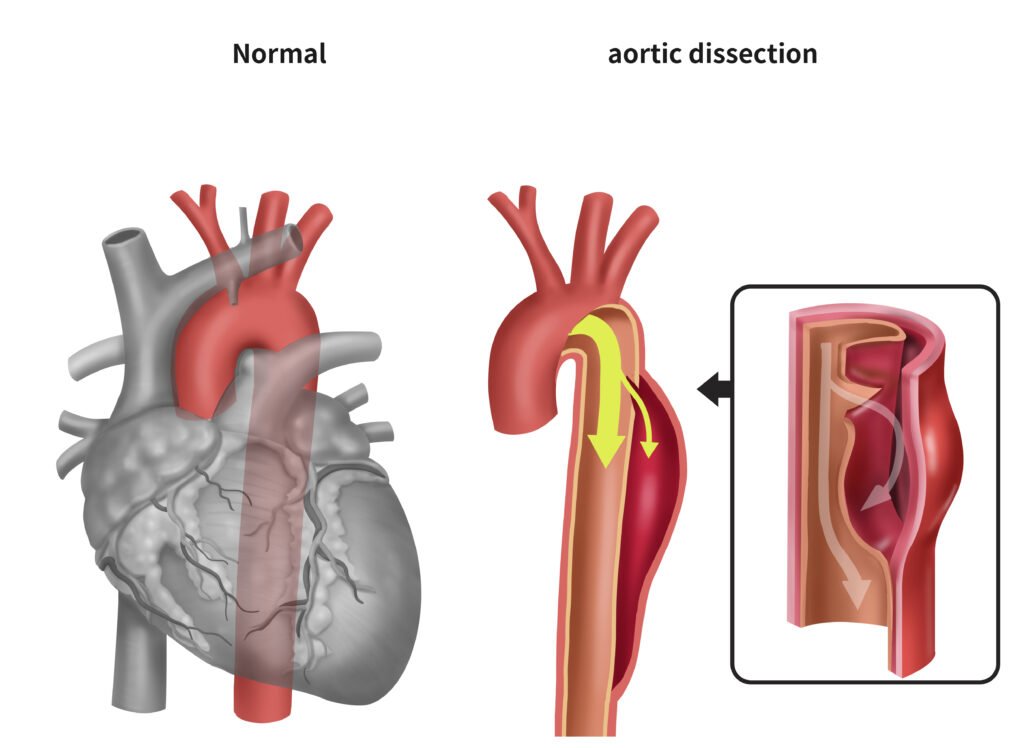
When it comes to heart health, most people think of blocked arteries, heart attacks, or high blood pressure. But one of the most dangerous, and often overlooked cardiovascular emergencies is the aortic dissection. Though relatively rare, this condition is highly fatal if not diagnosed and treated swiftly.
At Northern Heart Hospital, we’re not only dedicated to treating aortic dissections with the highest level of expertise, we also work to prevent them through early detection, advanced screening, and long-term risk management. Your heart deserves more than just emergency care. It deserves a plan for life.

What Is an Aortic Dissection?
The aorta is your body’s main artery, responsible for delivering oxygen-rich blood from the heart to the rest of the body. When a tear develops in its inner lining, blood surges through the opening, separating the layers of the vessel wall and forming what’s known as an aortic dissection.
This isn’t just a leak, it’s a dangerous and progressive condition that can block blood flow to vital organs, rupture the artery, and lead to sudden death.
Why Time Is Critical
Aortic dissections are time-sensitive emergencies. Every hour without diagnosis increases the risk of death by 1-2%, particularly in Type A dissections, which involve the part of the aorta closest to the heart. Rapid response, accurate imaging, and expert surgical or endovascular treatment are the difference between life and loss.
That’s why Northern Heart Hospital maintains 24/7 emergency cardiovascular teams ready to respond with speed, skill, and precision.
Types of Aortic Dissections
Aortic dissections are classified into two main types:
- Type A: Involves the ascending aorta (nearest the heart). Requires emergency open-heart surgery and carries the highest risk if untreated.
- Type B: Involves the descending aorta. These can often be managed with medications or minimally invasive procedures, depending on the severity.
Our diagnostic process is designed to rapidly identify the type and location of the dissection so that treatment can begin immediately.
Recognising the Signs: Symptoms You Should Never Ignore
Aortic dissections can present in dramatic or subtle ways. The classic symptom is sudden, severe chest or upper back pain, described as “tearing” or “ripping”. But symptoms can vary depending on the location of the tear and the organs affected.
Other warning signs include:
- Pain that radiates to the neck, jaw, abdomen, or back
- Shortness of breath
- Loss of consciousness or fainting
- Weak pulse in one arm or leg
- Stroke-like symptoms (difficulty speaking, limb weakness)
- Nausea, vomiting, or a sense of impending doom
Because these symptoms can mimic heart attacks, strokes, or gastrointestinal issues, fast and accurate diagnosis is essential. At Northern Heart Hospital, we’re trained to identify the difference quickly, often within minutes.
Who Is at Risk?
Although aortic dissection can strike suddenly and without warning, certain patients carry higher risk:
- Uncontrolled hypertension (high blood pressure)
- Genetic disorders (e.g. Marfan syndrome, Ehlers-Danlos syndrome)
- Bicuspid aortic valve or other congenital heart defects
- Family history of aortic disease or sudden death
- Atherosclerosis
- Trauma to the chest
- Cocaine or stimulant use
- Smoking
- Pregnancy-related vascular changes, particularly in women with underlying conditions
- Age (most common in men over 60), though it can occur in younger individuals
How Northern Heart Hospital Helps Prevent Aortic Dissections
Prevention starts with awareness and proactive care, and we take this responsibility seriously.
1. Advanced Cardiovascular Screening
We offer specialist screening programmes for:
- People with genetic predispositions
- Patients with unexplained chest pain
- Individuals with a family history of aortic disease or sudden death
- Patients with uncontrolled hypertension or abnormal aortic imaging
Our cardiac imaging suite includes echocardiography, CT angiography, and MRI to assess aortic size, elasticity, and potential weakness, even before symptoms appear.
2. Hypertension and Vascular Risk Clinics
Our cardiology team works closely with patients to manage blood pressure, the single most modifiable risk factor for aortic dissection.
We offer:
- Individualised medication plans
- Lifestyle coaching
- Salt-reduction programmes
- Stress and anxiety management strategies
- Smoking cessation support
This integrated approach ensures that blood pressure is not just controlled, but optimally managed for long-term heart health.
3. Aortic Surveillance Programme
For patients with known aortic aneurysms or aortic dilation (a precursor to dissection), we provide:
- Scheduled imaging at defined intervals
- Risk-based recommendations on physical activity and lifting
- Surgical or endovascular referral when thresholds for repair are reached
By catching structural changes early, we help patients avoid the emergency altogether.
Diagnosis and Emergency Treatment
If an aortic dissection does occur, our rapid-response team leaps into action with a coordinated treatment plan:
Diagnostic Tools:
- CT Angiography (CTA): Fast, accurate, and definitive
- Transoesophageal Echocardiography (TOE): Detailed heart and aorta imaging via the oesophagus
- MRI or Chest X-ray, where indicated
- ECG and blood tests to rule out other cardiac conditions
Treatment Options:
- Emergency open-heart surgery for Type A dissections
- Endovascular stent grafting for selected Type B cases
- Medication to lower heart rate and blood pressure
- ICU monitoring with 24/7 specialist care
- Multidisciplinary case review, ensuring the best path forward
Our hybrid operating theatres allow for simultaneous imaging and surgical intervention, cutting down critical minutes during lifesaving procedures.
Long-Term Management and Support
Recovery doesn’t end after discharge. At Northern Heart Hospital, we help patients regain their health, and their confidence.
Our comprehensive recovery services include:
- Cardiac rehabilitation: Gentle, supervised exercise, education, and counselling
- Regular follow-up scans: To monitor the repaired or dissected aorta
- Blood pressure clinics: To maintain stability
- Mental health support: PTSD, anxiety, and trauma-informed care
- Nutritional and lifestyle coaching: A heart-healthy approach to long-term wellness
Patient-Centred Care
We treat more than a torn aorta. We treat people, with families, fears, and futures. When it comes to aortic dissection, timing, expertise, and follow-through save lives. Here’s how we stand out:
- 24/7 emergency cardiac response
- Dedicated aortic disease prevention clinics
- World-class surgical and interventional teams
- Patient-centred rehabilitation and recovery plans
- Long-term aortic monitoring programmes
- Integrated mental and emotional health support
Whether you’re at risk, in recovery, or just learning about this condition for the first time, Northern Heart Hospital is your partner in protection and healing.
